The Cold TRUTH About Saturated Fat: The Real Facts You Need to Know
“The world is flat!” they cried… Shortly before shouting out “saturated fat gives you a heart attack!”…
It’s one of those universal truths of health, isn’t it?
Dairy is good for your bones… (errr, no it’s not)
Grains are good for your health… (nope)
And of course, saturated fats are bad for your heart…
I’m here to tell you today, that not only is this a total myth, but that saturated fats are actually GOOD for your heart and are a critical food you should be consuming daily.
Let’s Start At the Start: Why Have We Been Told That Saturated Fat is Bad
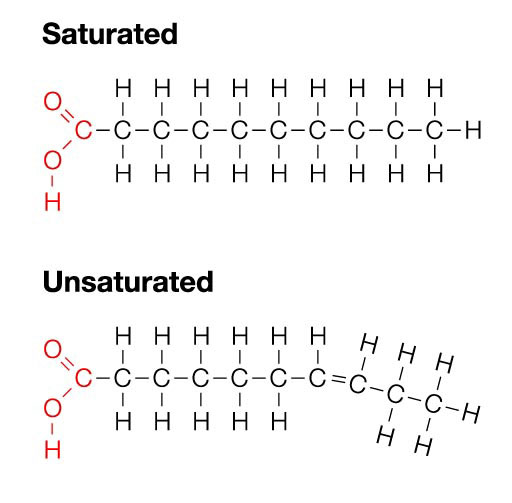
I know this is going to be a big leap for many people, because we’ve been told it so often it’s become gospel…so I want to explain the logic and the theory fully, and from the start.
We’ve been bought up on the ‘truth’ that saturated fats are bad our whole lives. Nobody has ever really explained it to us, but because enough people say it and believe it, it must be true.
Well, the truth is that back in the 1950’s it was decided that saturated fats are bad (which was fair enough based on the research and knowledge about cholesterol we had back then), and then (and this is important) an industry shot up around this.
The multi-billion dollar ‘Low-Fat’ industry has no interest in telling you that low-fat is dreadfully unhealthy and that the right fats are critical for health (they are called essential fats for a reason – nutrients that are classified as ’essential’ nutrients are those that the body cannot manufacture on it’s own and needs us to consume, and essential fatty acids are one of these nutrients).
When there is money at stake in the food/health industry, people will go to great lengths to protect that profit pool.
But the findings of the 50’s have been so ridiculously debunked, it is now beyond doubt that saturated fats are considered to be not only of no risk to our health, but are also considered to PROMOTE health in our arteries!
The Journey of Saturated Fat & Why You Should Consider It a Health Food
During the 40’s and 50’s incidence of heart disease in the United States skyrocketed.
From something that was relatively rare before, the US population was in the middle of a heart-attack epidemic. People we shocked, scared and needed to know why.
By the mid 50’s a theory emerged.
Researcher Ancel Keys produced what is now known as the famous “Seven Countries Study” in 1953 (1). It compared the diets of around 13,000 middle-aged men from the USA, Japan and a few European countries and concluded that the countries where the most saturated fats were consumed had the highest levels of heart disease.
The study had serious question marks, of course, but it was widely accepted and used as the focal point of the first ever US Government dietary guidelines, which firmly laid the blame on heart disease at the door of saturated fats.
(The major flaw was that the countries where the heart disease was highest were also the countries where sugar consumption was the highest, while Keys also left out many of the European countries such as France and Spain where fat intake was high but heart disease was low… In fact, the data from all 22 countries in the study were available and when analyzed, the supposed link disappeared.)
The theory was:
High cholesterol leads to heart disease…saturated fats contain cholesterol…therefore saturated fats cause heart disease…! Magic!
Makes sense right? We can’t go eatin’ that nasty cholesterol right?
Wrong.
Turns Out Cholesterol Ain’t All Bad…
So as we now know, there is ‘good’ and ‘bad’ cholesterol. High-Density Lipoproteins are good (HDL), and Low-Density Lipoproteins are bad (LDL).
And I know I can hear those naysayers now “but saturated fats raise both HDL and LDL, Ross!”…
And yes this is true.
BUT, there is another layer to this…
There are actually TWO types of LDL (2):
– small particle LDL: this is what causes the damage and can penetrate the arterial wall
– large particle LDL: this is a harmless, fluffy thing that does no damage at all
And this is the critical thing: the large, fluffy type of LDL actually renders the dangerous small LDL completely useless. It stops it from being dangerous (3).
And guess what saturated fats do?
Saturated fats raise the GOOD HDL cholesterol, which has been proven to benefit the heart…AND raises ONLY the large particle LDL which makes the LDL completely harmless!.
In other words, saturated fats are ridiculously GOOD for you!
This is Not Just Theory – It’s Proven on a Massive Scale
There have been so many landmark studies such as the Framingham Heart Study, the Nurses Health Study and more and I really love to look for those research reviews that look at collectives of large, long-term, human health studies such as these to draw real conclusions.
And there are two in particular that put the ‘saturated fat is bad for your heart’ rightly in the bin.
This research, “Meta-analysis of prospective cohort studies evaluating the association of saturated fat with cardiovascular disease” from the American Society of Nutrition looks at 21 studies which include a whopping total of 347,747 participants. In looking across the data on this massive group, their conclusion: there is absolutely no association between saturated fat and heart disease. (4)
And in this paper, “Association of Dietary, Circulating, and Supplement Fatty Acids With Coronary Risk”, published in March 2014 looked at 76 studies including 643,226 participants found that there was no link between saturated fat and heart disease. (5)
These aren’t small groups.
And there are so many more research studies disproving this link. So much so that the USDA have completely rewritten their guidelines on fat and cholesterol. Here are just some of the snippets:
“available evidence shows no appreciable relationship between consumption of dietary cholesterol and serum cholesterol…”
“Cholesterol is not a nutrient of concern for over consumption.”
“…dietary advice should put the emphasis on optimizing types of dietary fat and not reducing total fat.”
“reducing total fat (replacing total fat with overall carbohydrates) does not lower CVD risk.”
“The consumption of “low-fat” or “nonfat” products with high amounts of refined grains and added sugars should be discouraged.”
That’s Right, a Low-Fat Diet Does NOTHING For Your Health But Increase the Risk of Death…
It’s proven! At best it makes no difference to mortality rates. At worst, it increases the risk of a host of serious health conditions.
The Women’s Health Initiative was the biggest nutrition study in history. It was a randomized controlled trial with 46,835 women, all of who were instructed to eat a low-fat diet.
After eight years, there was only a 1lb difference in weight and zero difference in heart disease, cancer or death (6)
Other massive studies have confirmed this… the low-fat diet provides no benefit for heart disease or the risk of death (7)
And get this – this is perhaps the most telling of all – several studies that replaced saturated fat with polyunsaturated vegetable oils showed that more people in the vegetable oil groups ended up dying (8)
And when you look at the studies that compare the low-fat diet to other diets such as paleo-like, alkaline, vegan diets – the low-fat always loses out. (9, 10, 11)
So Here’s What I Recommend: My Guidelines for Fat Intake
I definitely do not recommend restricting fat intake. Fat is an essential nutrient that has been proven over and over again to be critical for human health.
I recommend getting at least 2 tablespoons of omega 3 daily (or equivalent). WhFoods.com give us this very handy table showing the best sources (12):
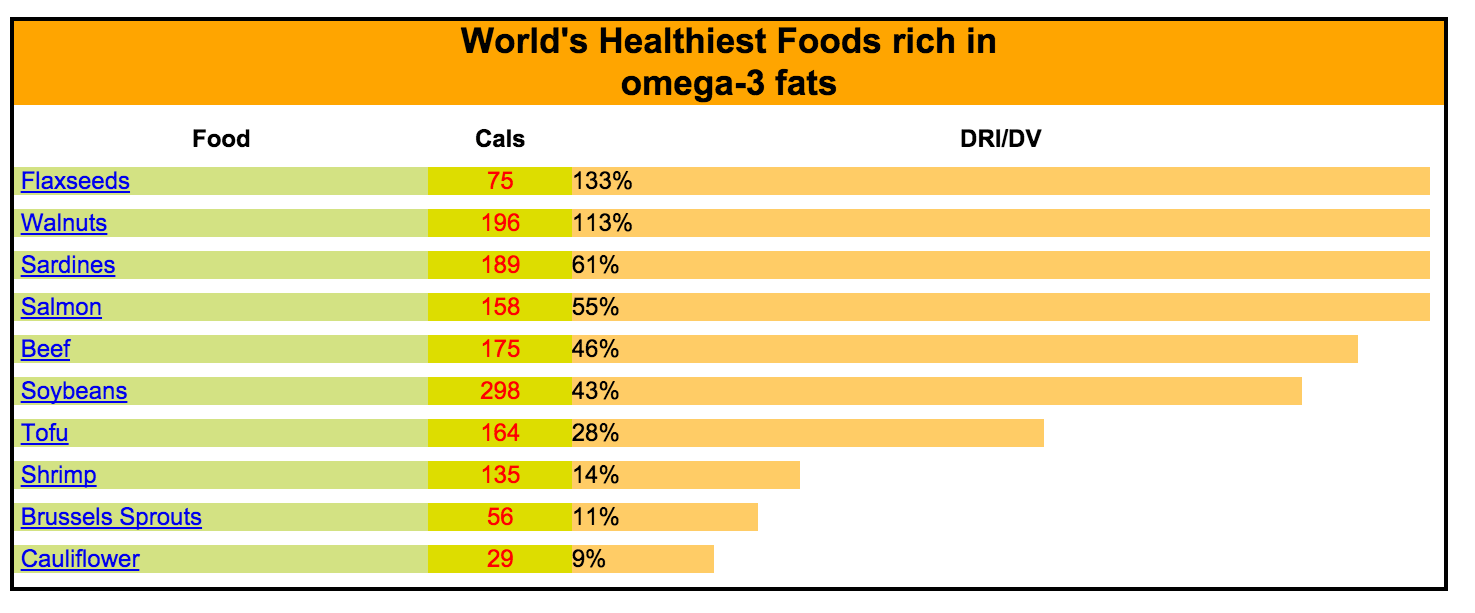
(go Brussels Sprouts!)
As well as the omega 3, I recommend at least a dessert spoon of coconut oil every day too. This is a saturated fat. We now know this is deliciously good for you!
It’s always worth having in the house, and I use it multiple times every day. I use it to cook with (it’s a great healthy oil to cook with as it’s very tolerant of heat, light and air – the three things that make most oils rancid and toxic). I use it in my smoothies as a delicious flavouring. I use it on my skin as a moisturiser. I use it to bake with (see my sweet potato chips in this new recipe here).
In fact, Organic Medic (13) has 77 uses for coconut oil here, but basically – if you cook with it, bake with it, include it in smoothies, stir fries, pop it in your porridge and so on – you should be able to get to a dessert spoon a day. And if in doubt, just have a spoon of it (liquid, a solid spoon might be weird).
If in doubt, use a supplement – oils are too important to miss out on.
But it’s as simple as that – using foods sources, oils on and in things, and supplements – get 2-3 tablespoons of omega 3 and 1 dessert spoon of coconut oil every day and your health and energy will skyrocket.
Ross
p.s this excellent talk from Nina Teicholz at TEDx explains the misunderstanding on saturated fat brilliantly:
p.p.s. for those looking for a heart-healthy diet that is actually based in nutritional science – rather than myths and marketing, here’s Mercola’s excellent excerpt from his Optimized Nutrition Plan:
References & Scientific Literature
1 Seven Countries Study
2 Krauss RM1. Heterogeneity of plasma low-density lipoproteins and atherosclerosis risk. Curr Opin Lipidol. 1994 Oct;5(5):339-49.
3 D M Dreon, H A Fernstrom, H Campos, P Blanche, P T Williams, and R M Krauss; Change in dietary saturated fat intake is correlated with change in mass of large low-density-lipoprotein particles in men. Am J Clin Nutr May 1998 vol. 67 no. 5 828-836
4 Patty W Siri-Tarino, Qi Sun, Frank B Hu, and Ronald M Krauss; Meta-analysis of prospective cohort studies evaluating the association of saturated fat with cardiovascular disease; January 13, 2010, Am J Clin Nutr
5 Rajiv Chowdhury, MD, PhD; Samantha Warnakula et al; Association of Dietary, Circulating, and Supplement Fatty Acids With Coronary Risk: A Systematic Review and Meta-analysis; Annals of Internal Medicine, 18 March 2014, Vol 160, No. 6
6 Barbara V. Howard, PhD; Linda Van Horn, PhD; et al; Low-Fat Dietary Pattern and Risk of Cardiovascular Disease; JAMA. 2006;295(6):655-666
7 Multiple Risk Factor Intervention Trial; JAMA, September 24, 1982, Vol 248, No. 12
8 Christopher E Ramsden, Daisy Zamora et al; Use of dietary linoleic acid for secondary prevention of coronary heart disease and death: evaluation of recovered data from the Sydney Diet Heart Study and updated meta-analysis; BMJ 2013; 346
9 C Mellberg, S Sandberg, M Ryberg, M Eriksson, S Brage, C Larsson, T Olsson and B Lindahl; Long-term effects of a Palaeolithic-type diet in obese postmenopausal women: a 2-year randomized trial; European Journal of Clinical Nutrition 68, 350-357 (March 2014)
10 Neal D Barnard, Joshua Cohen, David JA Jenkins, Gabrielle Turner-McGrievy, Lise Gloede, Amber Green, and Hope Ferdowsian; A low-fat vegan diet and a conventional diabetes diet in the treatment of type 2 diabetes: a randomized, controlled, 74-wk clinical trial; Am J Clin Nutr May 2009; vol. 89 no. 5
11 M. Hession, C. Rolland, U. Kulkarni, A. Wise andJ. Broom; Systematic review of randomized controlled trials of low-carbohydrate vs. low-fat/low-calorie diets in the management of obesity and its comorbidities; Obesity Reviews, Volume 10, Issue 1, pages 36–50, January 2009
12 Sources of Omega 3 from WHFoods
13 Coconut Oil Uses


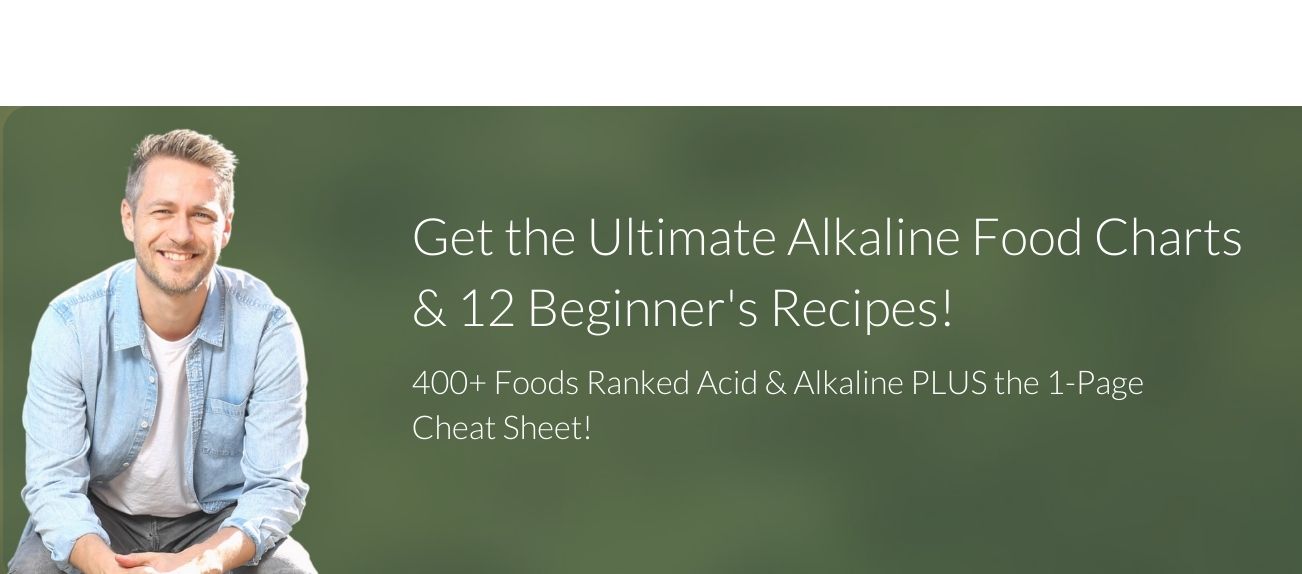

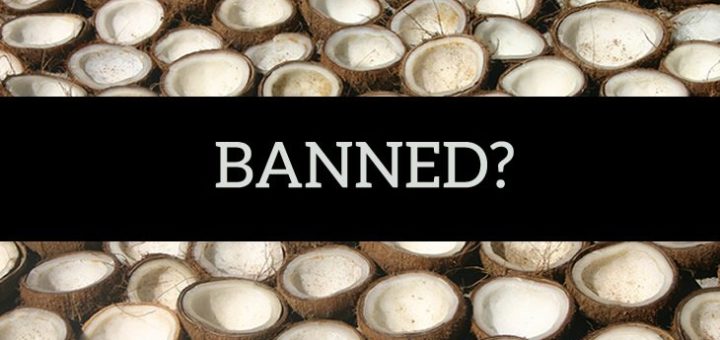
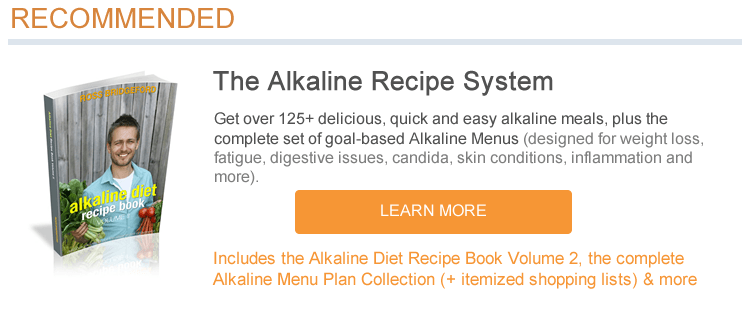
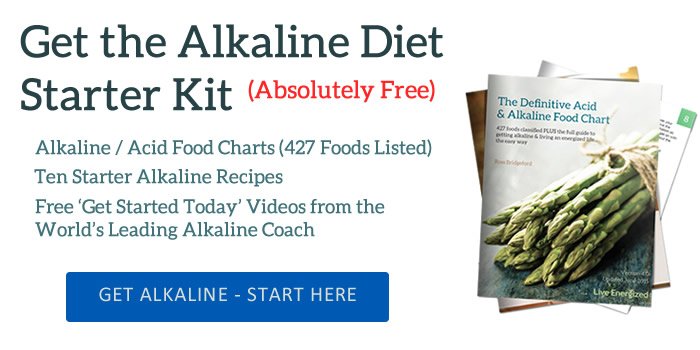
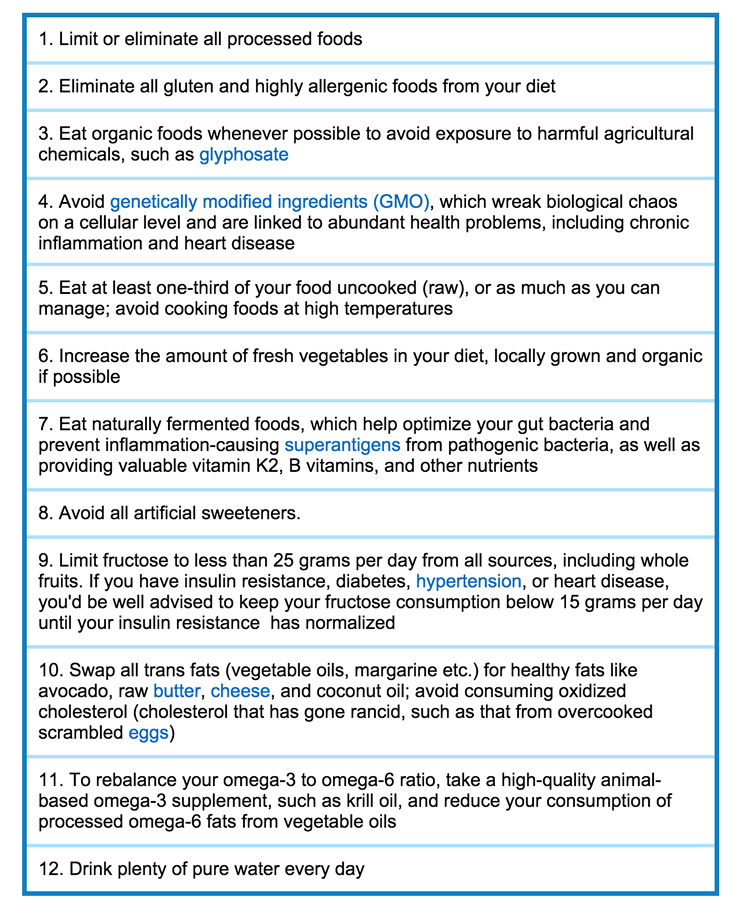

Thanks for your article about the saturated fats are actually good to be be consuming daily. Really interesting to read it.
Ross, I’ve just bought a bottle of Extra Virgin Organic Coconut Oil and are taking it twice a day with meals. Is coconut actually so good as recommended by so many sources. Are there any cons in consuming coconut oil this way?
I’m also following your 7 Day alkaline drink for kidney and liver and found it good. Thanks for all you’ve been doing out there!
Regards,
Grace
Hey Grace – you don’t need to have more than a dessert spoon per day, any more than this is not required. So if you’re splitting that into two, maybe make it 2 teaspoons – one in the AM and one in the PM.
Awesome article! Thank you. I’m vegan, currently consuming over 130g daily in healthy fats (counting in a spoon each of 3 different oils (inc;. coconut), many seeds and nuts, avocado, etc), wondering is this too much, would you say? Since they talk about around 80g for my bodyweight (70kg)
What would be your thoughts on this, Ross? How much fat do you usually consume daily?
Hi Ross I’m on cholesterol medication for high choesterol, and wondered if it is safe to take
Coconut oil. Also I’m gluten intolerent so I have to watch what I’m eating.
,kind regards
Debbie.
Are you kidding me? This “talk” reminds me of a high school debate speech – not a stellar one. The “evidence ” that one should include essential fat to one’s diet is unconvincing to a person who has benefited greatly from a whole foods, plant based diet. My body has given me all the evidence I need! I have to wonder who subsidized all these years of research?
I have absolutely no idea if you’re agreeing with me or disagreeing!
Thanks for this article and it does make a lot of sense to me.
I tried Coconut Oil and ended up with Gallstones (had an ultrasound done and was advised to remove my Gallbladder, not happening). Since Coconut Oil was the only oil I implemented I stopped using it and I have never had an issue with my Gallbladder since. I am also intolerant of Coconuts and all tropical fruit.
What would you recommend that I use instead to do my baking, frying etc.? Currently I am using Cold pressed Organic Olive Oil.
I have also started to take one Tbsp of Flax Oil and have had no problem with it.
Thanks for your recommendation in advance.
Martina
Hi Ross,
My appetite is ravenous (I’m a nurse and I moderately exercise), so I need a lot of nutrients every day and I’ve just started to include cheese in my diet to suppress the appetite a bit, and get more probiotics. I see in the above article Mercola states to eat cheese. Can you inform me on what TYPE of cheese would be good for health?? Some say white cheese, some say yellow. And I see above you also say dairy is not so good for you, which I agree with, but I’m vegetarian and I run out of options sometimes as I’m an extremely busy person and sometimes preparation is not my specialty. I feel very sick and empty if I cut out grains all together. I try now to stick to oats, rye or rice.
Any advice would be greatly appreciated. Thanks!
Amy
Hey Amy
First up – congrats on staying with it despite your challenges!
I recommend steering totally clear of the gluten containing grains and going with:
oats
quinoa
buckwheat
amaranth
chia
teff
And getting further protein from beans & pulses. If you are going to have a little cheese, just stick to the harder cheeses. Thats the easiest rule of thumb.
Including more fats, proteins and non-gluten grains will definitely ease the appetite, and as your hormones get back in balance (from eating this way) you’ll find your appetite gets even more in control.
Ross
Whoa! This is deep, should have known. Back to daily flaxseeds. I love how how I feel when I eat them. Thank you for sharing such great information!
Thanks for sharing the science behind this, Ross. Coconut oil is my preferred cooking oil and friends were telling me that it is extremely bad for me, especially since I use it all the time. It sounds like you use it a lot as well. I’m curious … you recommend a dessert spoonful each day. Is there any downside to consuming a lot more than that? I probably consume the equivalent of 2 – 3 tablespoons per day.